Gambling Addiction Study USA – 968 Participants

As part of our global study on gambling addiction, we asked 968 American gambling addicts about their gambling habits. The total data set comprises over 3320 gambling addicts worldwide. If you want to know more, check out our full gambling addiction study here.
The data was collected via a signup form for our member’s platform on QuitGamble.com from June 2023 to January 2024.
On this page, we examine data specific to the United States. We conducted the study to understand our members so we can provide better service.
If you want to know more about the dataset or collaborate. Please contact Anders Bergman via support@quitgamble.com.
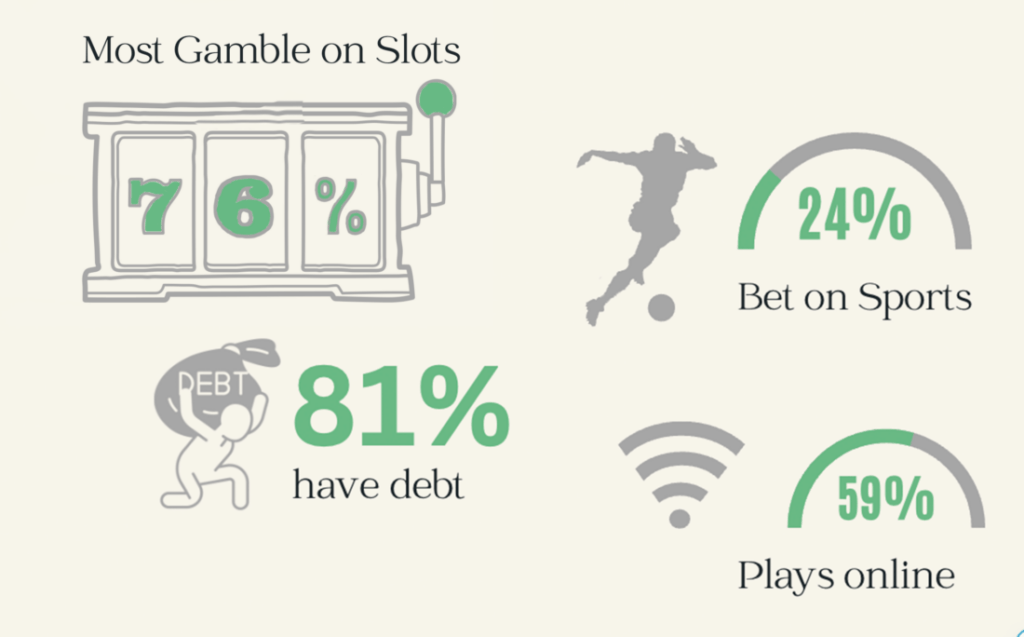
Key US Gambling Addiction Findings
- 76% of American problem gamblers gamble on slot machines
- 91% of female gambling addicts play slots
- 32% feel out of control and need structure to stop gambling.
- About 59% of problem gamblers in the US gamble online, and 34% gamble on land-based casinos.
- 50% of Americans seeking help online for gambling problems are women
- The most common problem gamblers gamble is to win big (33%)
- 23% gamble to escape.
- Over 81% of problem gamblers in the US struggle with debt.
- Female gamblers struggle more with debt than males.
- Only 24% gamble on sports compared to 38% worldwide.
Data discussion
The data is based on responses from people applying for membership on QuitGamble.com. QuitGamble.com is a platform for people seeking help with gambling problems. We have assumed that the respondents have gambling problems.
On this page, we only examine data responses from American users. To ensure that the person answering is a problem gambler, we first asked how you plan to use the platform. We have only included answers from respondents who answered, “I want to stop gambling.” In total, we got 968 responses.
In undertaking this focused study on gambling addiction within the United States, we emphasize that all participants willingly consented to anonymously share their data for research purposes, as outlined in the Terms and Conditions agreed upon during their registration on QuitGamble.com. This consent is foundational to our ethical data collection methodology, affirming our dedication to member privacy while enabling us to derive meaningful insights specific to gambling addiction in the United States. Our staunch commitment to ensuring anonymity and confidentiality underpins our efforts to comprehensively analyze the data, aiming to deepen our understanding and bolster our support for individuals battling gambling addiction across the nation.
Why do problem gamblers gamble?
We believe the key to stopping gambling is understanding why you gamble. Hence, we asked our members, ” What is the main reason you gamble? ” (Why do you gamble?) The respondents could only choose one reason.
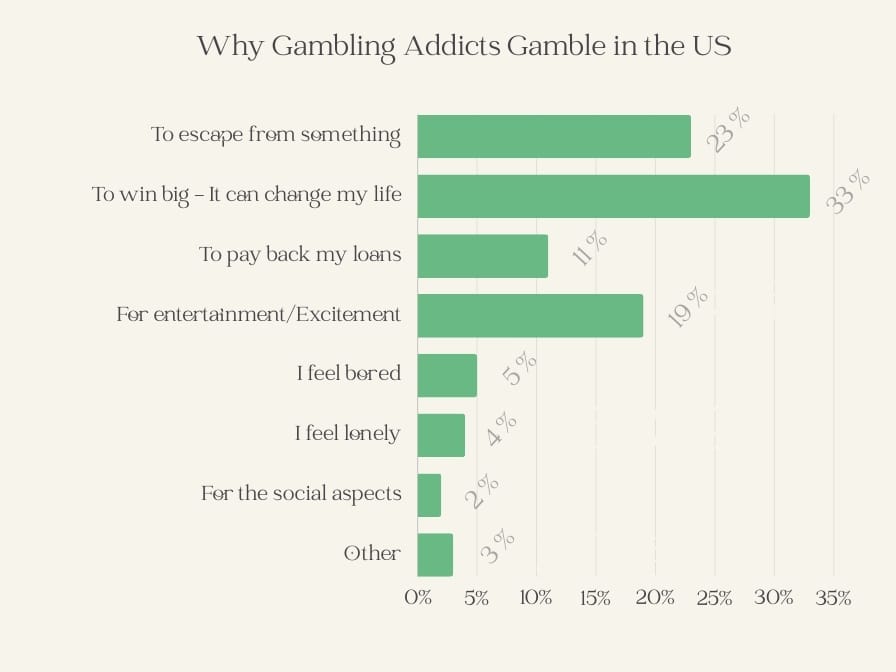
To win big – it can change my life, which is the most common reason why problem gamblers gamble in the United States. 33% of the responded to win big. 23% said that they gamble to escape from something, while 19% gamble for entertainment.
Debt is a common consequence of gambling, and 11% said they gamble to pay back loans. (Perhaps a sign of chasing losses, which is a common symptom of gambling addiction.) Only 2% gamble for social reasons. 5% gamble because they feel bored, and 4% due to loneliness.
—-
Comment: Most coaching calls begin with questions about why the person gambles. The results from the problem gambling study mirror the answers in the coaching calls. Most say they gamble to win big, but after a few minutes, they often change their mind to gambling to escape something.
The fact that 33% of American problem gamblers believe they gamble to win big is crucial to address if they want to stop and look for support. Helping them understand what’s behind their gambling will greatly increase their chances for a successful recovery.
Why do gambling addicts seek help?
To better understand our members’ needs, we asked them what they struggled with most. The respondent could only choose one answer.
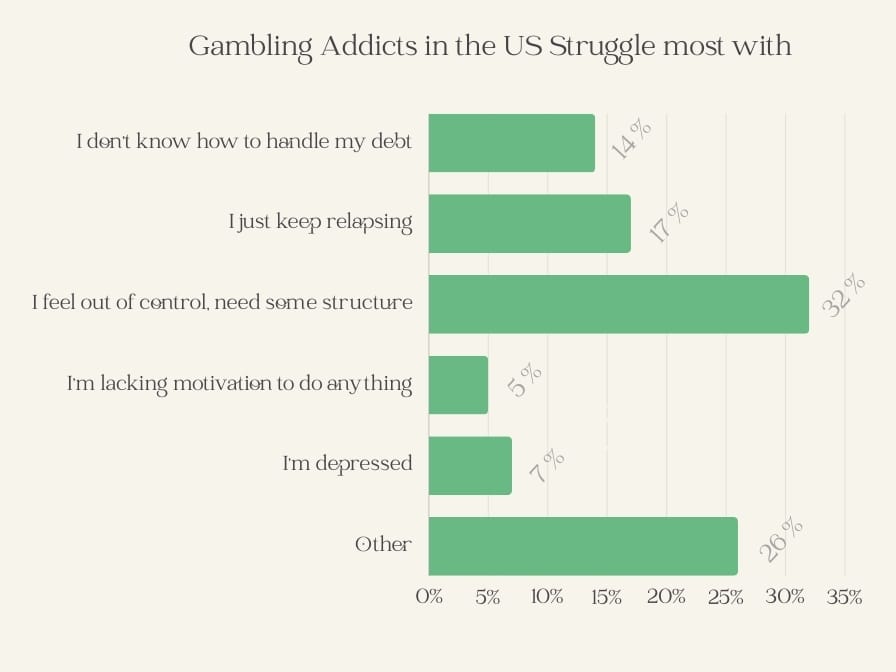
Among problem gamblers in the US, 32% struggle most with feeling out of control and the need for structure. Many say they keep relapsing over and over (17%), and 14% don’t know how to handle their debt.
One American study showed that 69% of compulsive gamblers are or have been depressed in the last 12 months. About 7% of the respondents answered that depression is what they struggle with most now. Lack of motivation (5%) can be connected to depression.
Over 26% of the respondents answered “other, ” which indicates that we still don’t know what these people struggle with. For future studies, we might include more options or let the person write down what they struggle most with manually.
Seeking help online vs Seeking help from physical treatment
Where do people seek help for gambling addiction? One study showed that 93% of the members of Gamblers Anonymous are men. In the UK, Gamcare reported that 70% of the callers of the National Helpline were men. On QuitGamble.com, 67% of the global members are men, BUT. In the United States, more women (50.4%) than men (49.6%) seek help online via QuitGamble.com.
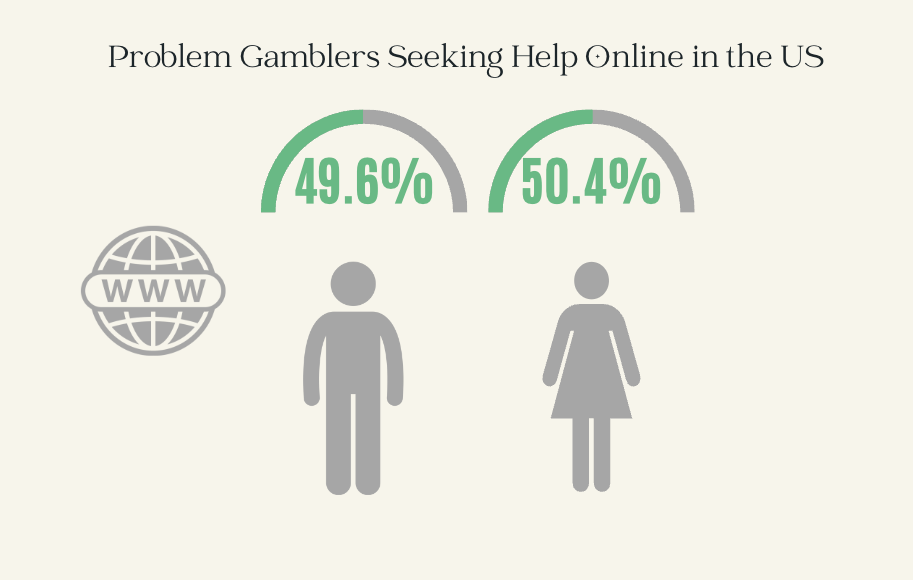
Comment: About 80% of people with gambling problems never seek help. The data shows that more women than men seek help online in the US. If online help is a preferred choice for female problem gamblers, we need to ensure that there are more online options.
Where do gambling addicts gamble?
We asked, ” Where do you gamble? ” The options were online, land-based, both, or others. More than 81% of problem gamblers are online, and 14% only gamble in land-based facilities.
In the United States, 59% gamble online and 34% at land-based casinos.
Gambling debt – Do you struggle with debt?
Gambling debt and struggling with debt are consequences of gambling addiction. We wanted to know how many of our members struggle with debt. 81% of the American problem gamblers struggle with debt. 85% of the female respondents said they struggle with debt. Among men, 79% had gambling debt.
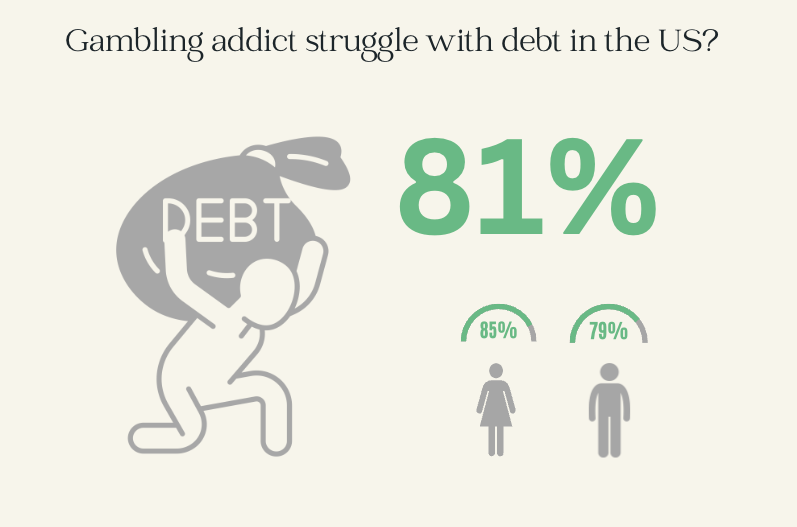
What do gambling addicts gamble on?
One way to identify which games are most addictive is by asking gambling addicts what they gamble on. We let the respondents choose multiple options since a symptom of gambling addiction is that the person gambles on many things.
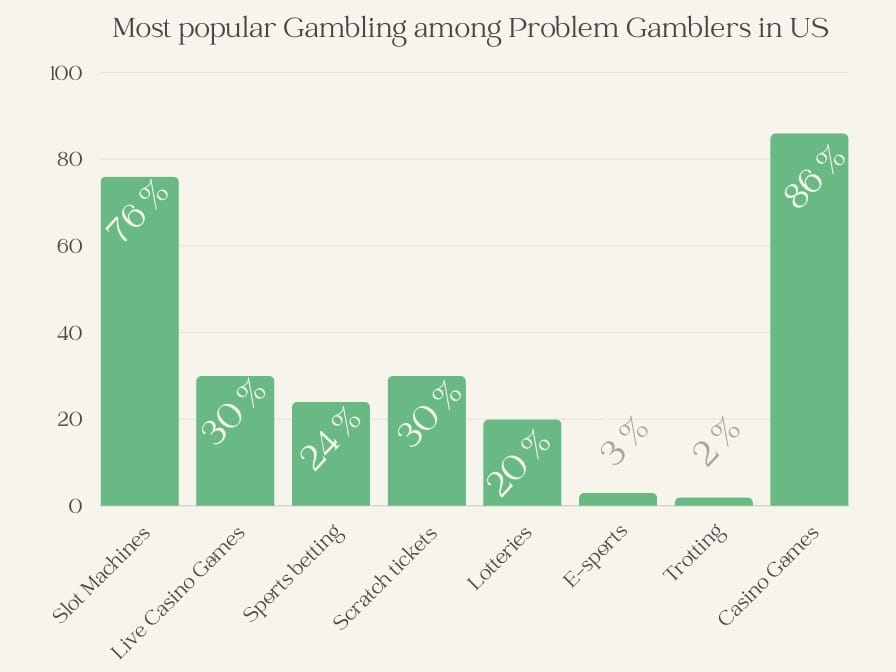
American gambling addicts’ favorite form of gambling is slot machines (76%). Live casino games can be played both online and in land-based casinos and get attention from 30% of the problem gamblers. Combined, 86% of the respondents gambled on some form of casino game.
Scratch tickets are also popular with 30% of the players. About 24% gamble on sports betting. (24% is still low compared to the global average of 38%.) 20% gamble on lotteries. 3% bet on esports and 2% bet on horses.
Comment: In the age group 18-25, 18% bet on esports. It’s 6x more common in that group compared to the average. We see a similar pattern globally. The esports betting industry continues to grow, and it’s likely that the part of problem gamblers gambling on esports will continue to increase as well.
State after state is opening for online sports betting in the United States. Currently, 24% of the problem gamblers gamble on sports. That number is likely to increase when sports betting becomes more available.
Poker is another popular form of gambling. To be honest, we forgot to ask about poker in our questionnaire.
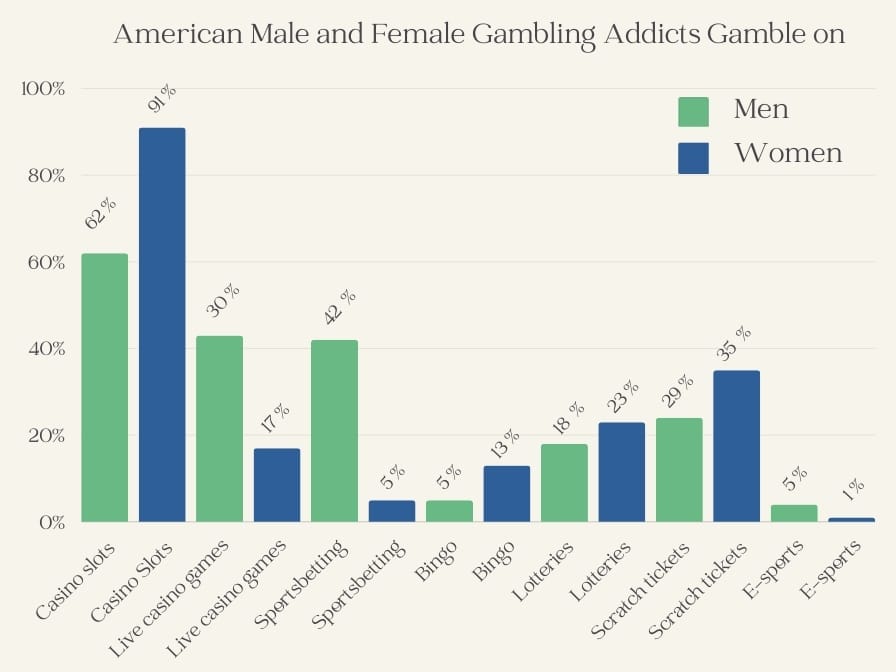
As an extra, we’ve compared the differences between what men and women gamble on. In our American problem gambling study, we found that 91% of female gambling addicts gamble on slot machines, while only 62% of men do.
It’s completely different for sports betting. 42% of men and just 5% of women engage in sports betting. Female problem gamblers gamble more on lotteries (23%) than men (18%), and similarly, women gamble more often on scratch tickets (35%) than their male counterparts (29%).
When we combine all casino games (slots and live casino games), 94% of the women and 77% of the men gamble on casino games.
Comment: The data about differences between what men and women gamble on is important because it can help put preventive information about the risk of gambling in the right places. Focus on responsible gambling and problem gambling messages to men in sports betting since the waste majority are men.
Extra Sources
PGI (2021) – 2021 Statewide Assessment of Gambling and Problem Gambling in Illinois
Potenca (2001) – Gender-Related Differences in the Characteristics of Problem Gamblers Using a Gambling Helpline – Marc N. Potenza, M.D., Ph.D., Marvin A. Steinberg, Ph.D., Susan D. McLaughlin, M.P.A., Ran Wu, M.S., Bruce J. Rounsaville, M.D., and Stephanie S. O’Malley, Ph.D.